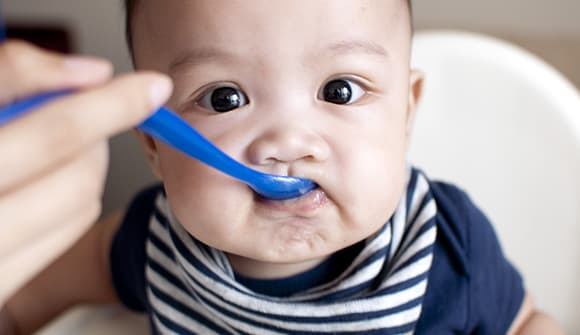Feeding your baby for the first year
Every baby’s diet is different, but some helpful tips apply to all.
Article Date:

Newborns spend most of their time eating, sleeping and needing diaper changes, but these routines are far from simple. Each step plays a crucial role in baby’s growth, development and overall health. Feeding supports both nutrition and bonding, sleep fuels brain and physical development, and diaper changes offer clues about hydration and digestion.
With so much happening in these early weeks, Shiree Sauer, MD, a pediatrician with Baptist Primary Care in Orange Park, said it’s natural for parents to have questions about how much their baby should be eating and sleeping, and those questions will evolve as their newborn grows.
Feeding for growth and cues
Dr. Sauer suggested parents keep a record of how much their baby eats in 24 hours rather than during each feeding. Making sure your little one is eating enough overall will help them gain a healthy weight. There are minimum amounts a child is expected to gain at certain age benchmarks, and it’s more telling to track how much they’re eating over a day than at each "meal."
“Babies who are breastfed tend to develop a natural rhythm for gauging how much milk they need because they naturally control how much they eat from the start,” said Dr. Sauer. “To mimic that same ‘feeding on demand’ approach with a bottle, try offering about half an ounce more than your baby usually drinks. They may stop when they’re full or take the extra if they’re still hungry. Either way, it gives your baby the chance to follow their own hunger cues.”
Starting solids safely
Starting your baby on solids is a developmental milestone, which usually occurs between 5 and 6 months of age when the infant can sit in a highchair that doesn’t recline. Your baby’s pediatrician will know when your little one is ready for solids and can offer guidance on how best to make the transition. Until then, breastmilk and/or formula provide all the nutrients needed for growth.
One safety note that applies to all parents: Don’t feed your infant hot dogs, nuts, round candies, grapes, popcorn or hard fruits and vegetables because they’re common choking hazards.
Allergen introduction and food safety
One surprise parents may encounter is the newer recommendation from doctors to introduce potential food allergens early. Studies show exposure to peanuts, eggs, fish and strawberries decreases the risk of developing allergies.
“I think the biggest change is that parents are now introducing foods that they used to avoid at this early age. Physicians previously encouraged parents to wait to introduce these foods until the baby was a year or older,” said Dr. Sauer. “Many recent studies have been done on this, and it has been found that even in children who have a genetic predisposition to allergies, introducing potential food allergens at around 6 months decreases their chances of developing food allergies.”
Much like transitioning to solids, your baby's pediatrician can advise you on how to introduce these foods.
One thing to keep away from baby until after he or she turns 1: honey, which can carry bacteria called Clostridium botulinum. This can cause a serious disease called botulism when it enters a baby's developing digestive system. Similarly, undercooked meat and fish can carry harmful bacteria and parasites that a baby’s immune system isn’t yet equipped to handle, increasing the risk of foodborne illness.
Questions or concerns about your baby’s eating habits?
A pediatrician can provide guidance for every step along the way. To find a provider near you, call 904.202.4YOU (4968) or fill out the appointment request form.


